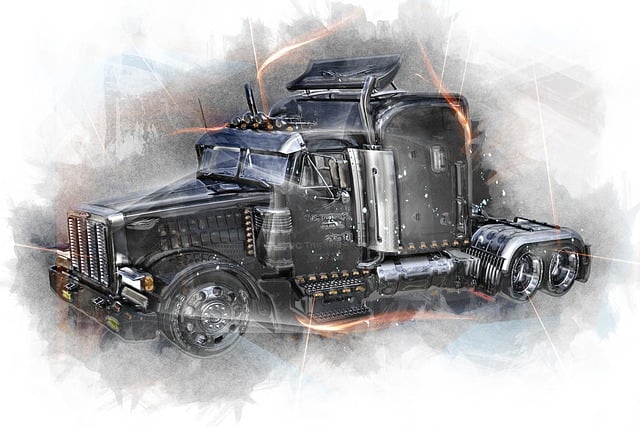For small businesses with fleets of trucks, securing a comprehensive and cost-effective fleet insurance plan is essential. Multi-truck policies designed specifically for these enterprises offer an efficient way to insure multiple vehicles under one umbrella, facilitating easier management as the business scales up. These plans are advantageous, providing streamlined administration and often more economical than individual vehicle policies due to available discounts, alleviating financial strain. Key coverages include liability insurance for fleets to meet legal obligations in case of accidents, cargo insurance to protect goods in transit, and physical damage policies to shield against financial losses from vehicle-related incidents. These tailored multi-truck policies are customizable to fit small businesses' specific operational requirements, ensuring robust yet affordable protection. Small business owners can thus concentrate on their core operations, confident that their fleet is safeguarded against unexpected events, with options for cargo insurance and physical damage coverage included in the plans. Investing in such policies represents a strategic move for operational stability and long-term financial health in the competitive transportation sector.
When a small business expands its fleet, navigating the intricacies of vehicle addition or change can be a complex task. This article delves into the essentials of ensuring seamless coverage transitions with a focus on multi-truck policies tailored for small businesses. We explore the nuances of fleet insurance plans, provide best practices for managing multiple vehicle coverage, and highlight the importance of comprehensive liability coverage for fleets. Additionally, we address how cargo insurance and physical damage policies protect small business assets, all while emphasizing affordability and continuity in small business truck insurance. With these insights, businesses can safeguard their operations on the move.
Optimizing Fleet Insurance Plans for Small Businesses: A Guide to Affordable Multi-Truck Policies

For small businesses managing a fleet of vehicles, securing comprehensive and cost-effective insurance coverage is paramount. Multi-truck policies tailored for small businesses offer a seamless solution for protecting multiple vehicle assets under one umbrella. These policies are designed to simplify the management of insurance needs, ensuring that as your business grows and you add more trucks, your insurance coverage can expand in tandem without the need for separate insurance arrangements for each vehicle. Opting for fleet insurance plans not only streamlines the administrative process but also tends to be more affordable than individual policies due to potential discounts, reflecting a reduced financial burden on small businesses.
A robust fleet insurance plan encompasses essential coverages such as liability insurance for fleets, which addresses the legal responsibilities of your business when an accident occurs involving one of your trucks. Additionally, cargo insurance is a critical component for small businesses that transport goods, safeguarding against loss or damage to the merchandise being hauled. Physical damage policies are also an important aspect of comprehensive fleet coverage, protecting your business from financial losses due to vehicle collisions, theft, or natural disasters. By carefully selecting and tailoring these elements within multi-truck policies, small businesses can secure affordable yet reliable insurance options that cater to their unique operational needs.
Navigating Multiple Vehicle Coverage: Best Practices for Seamless Transitions in Small Business Truck Insurance

For small businesses operating multiple vehicles, securing a comprehensive fleet insurance plan is paramount for maintaining operational continuity. A multi-truck policy tailored to small business needs can offer seamless coverage transitions during vehicle additions or replacements. These policies are designed to streamline the process of expanding or updating your fleet, ensuring that each new vehicle is promptly covered under the same terms and conditions as existing ones. By opting for a multi-truck policy, businesses can avoid lapses in liability coverage for fleets, which could otherwise arise from adding vehicles without coordinated insurance. It’s wise to work with insurance providers who specialize in small business truck insurance to ensure that the coverage is both comprehensive and affordable, reflecting the unique challenges and financial considerations of running a fleet.
Cargo insurance for small businesses is another critical component within multi-truck policies. Cargo represents a significant investment, and its protection against loss or damage during transit is essential. Physical damage policies can be included in your fleet insurance plans to safeguard your vehicles from collision and comprehensive risks, regardless of who is at fault. These inclusions ensure that small businesses are not left financially vulnerable should an incident occur. By carefully selecting a fleet insurance plan that encompasses all these aspects, small businesses can enjoy the benefits of multiple vehicle coverage without the hassle of managing disparate policies for each truck, thereby maintaining their focus on core business operations.
Comprehensive Liability Coverage for Fleets: Ensuring Your Small Business is Protected on the Road

As your small business expands and includes a fleet of trucks, securing comprehensive liability coverage becomes paramount to protect against unforeseen events on the road. Multi-truck policies designed for small businesses are tailored to offer a robust fleet insurance plan that encapsulates multiple vehicle coverage under one umbrella. This approach not only simplifies management but also often proves to be more cost-effective than insuring each vehicle separately, providing affordable multi-truck policies that accommodate the budgetary constraints of growing enterprises. These tailored plans ensure that your trucks are covered for various liabilities, including cargo insurance, which is essential for small businesses that deal with valuable or sensitive goods.
Moreover, a well-structured fleet insurance plan should include physical damage policies to safeguard against collisions, theft, vandalism, and natural disasters. This aspect of coverage is crucial for maintaining business continuity in the face of adversity. Additionally, with physical damage coverage, small business owners can rest assured that their investment in trucks and cargo is protected, allowing them to focus on operational efficiency rather than potential financial setbacks from vehicle damages or losses. By opting for a comprehensive fleet insurance plan that encompasses all these aspects, small businesses can navigate the complexities of multi-vehicle operations with confidence and peace of mind.
Protecting Your Assets: Cargo Insurance and Physical Damage Policies for Small Business Owners

For small business owners managing a fleet of trucks, securing comprehensive multi-truck policies is paramount to protect against unforeseen events. Fleet insurance plans are designed to cater to the unique needs of such businesses by offering multiple vehicle coverage under one policy, which not only simplifies management but also ensures that all assets are adequately insured. These tailored plans often include cargo insurance for small businesses, an essential aspect given the valuable goods transported daily. Moreover, including physical damage policies within these plans can provide peace of mind, as they safeguard against vehicle damage resulting from non-collision incidents like theft, vandalism, or natural disasters.
Affordable multi-truck policies are a strategic investment for small businesses aiming to maintain operational continuity without the financial burden of individual insurance premiums for each vehicle. These policies often encompass liability coverage for fleets, which is crucial for protecting against legal and medical costs arising from accidents involving your trucks. By opting for fleet-wide insurance, small business owners can ensure seamless coverage transitions during vehicle additions or changes, a critical aspect of maintaining uninterrupted business operations. This approach not only safeguards the physical assets of the business but also supports long-term financial stability and growth within the competitive transportation industry.
In conclusion, small business owners can navigate the complexities of fleet management with confidence by adopting tailored multi-truck policies that cater to their unique needs. The key to maintaining seamless coverage transitions during vehicle additions or changes lies in proactive planning and understanding the intricacies of fleet insurance plans. By considering comprehensive liability coverage for fleets, ensuring adequate cargo insurance for small businesses, and safeguarding against physical damage with robust policies, entrepreneurs can protect their assets effectively while keeping operational costs in check. The best practices outlined in this guide for handling multiple vehicle coverage will help ensure that your business remains resilient on the road, whatever the journey may bring.
